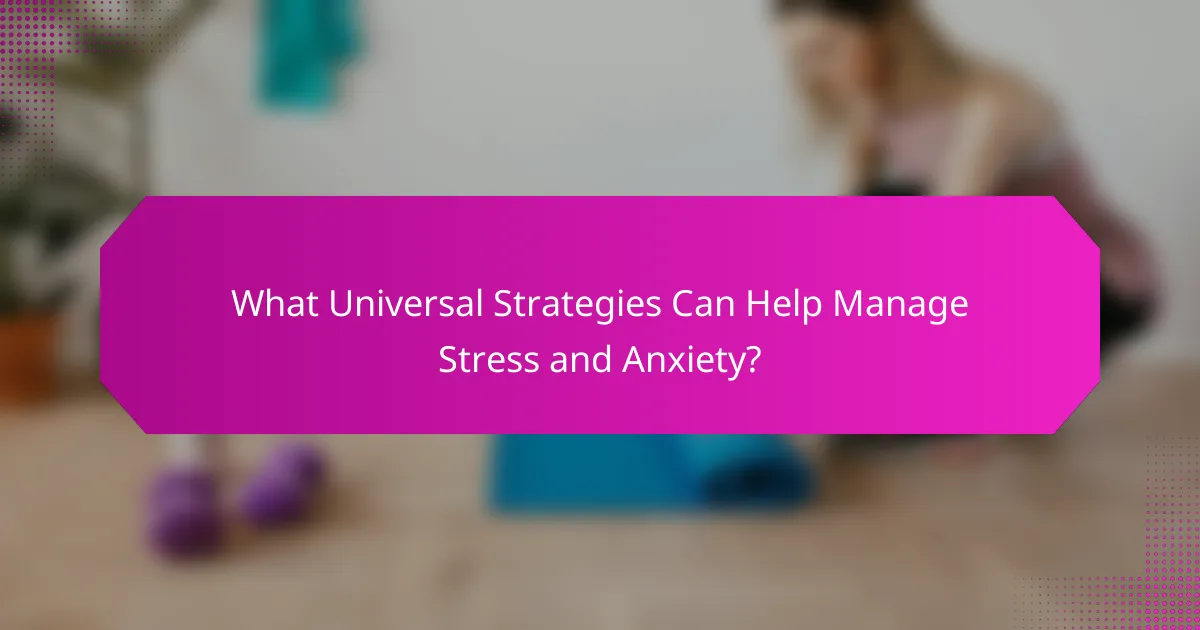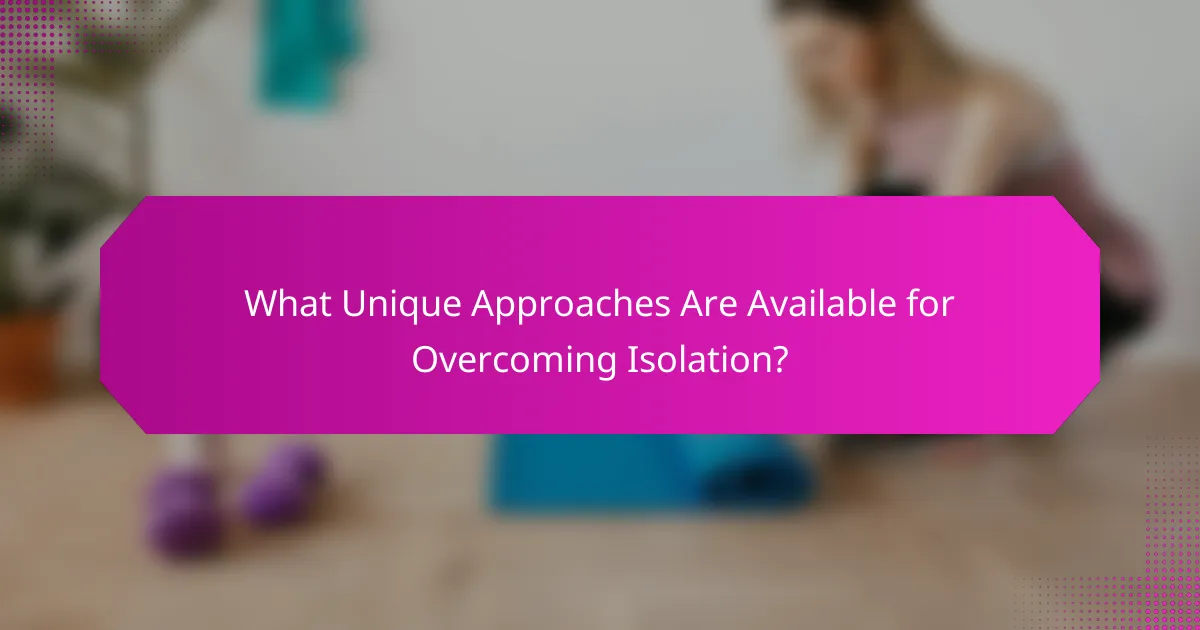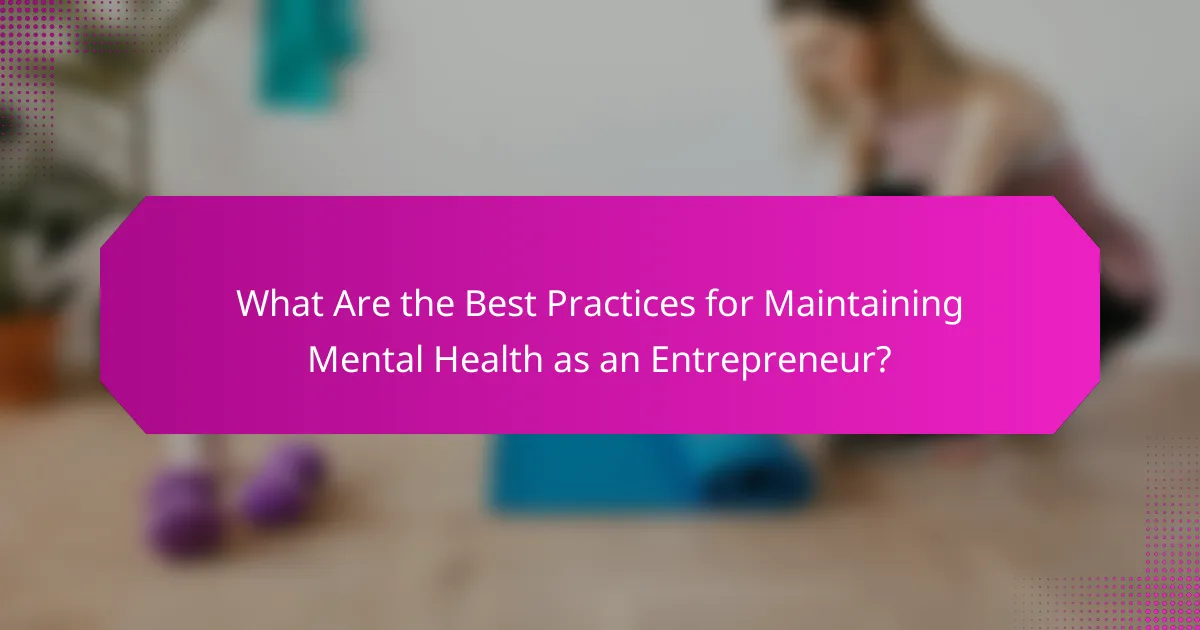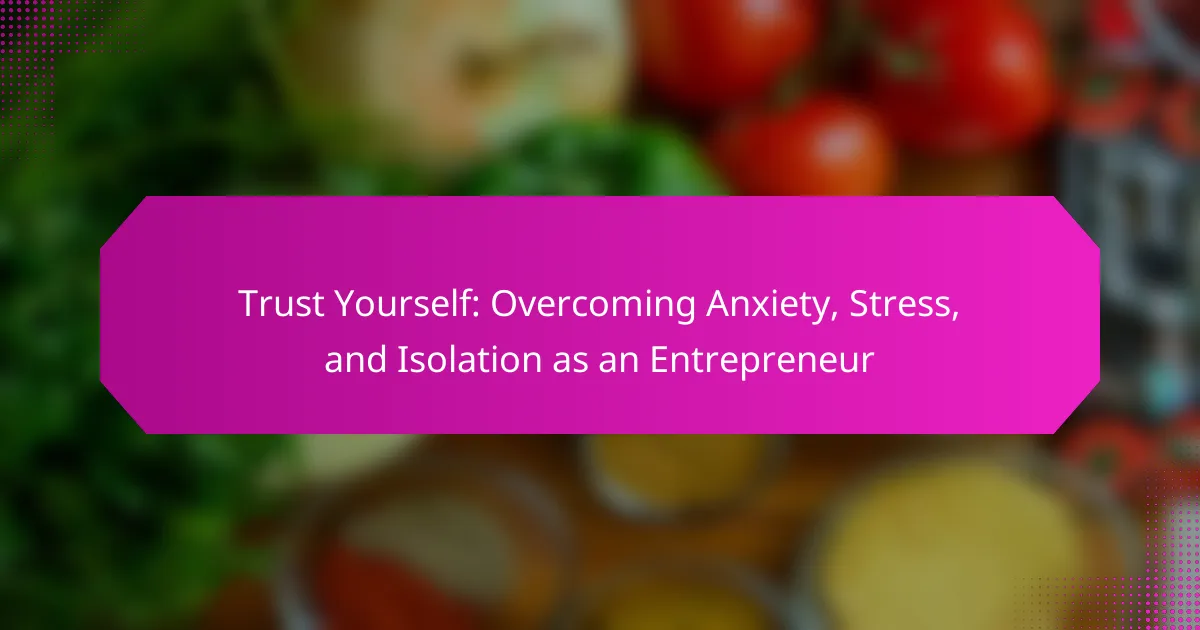Trusting yourself is crucial for overcoming anxiety, stress, and isolation as an entrepreneur. Building self-trust enhances confidence and helps manage anxiety effectively. Practicing mindfulness techniques and engaging with supportive networks can reduce stress and combat feelings of isolation. Setting achievable goals and celebrating small wins fosters resilience and promotes a balanced routine.

How Can Entrepreneurs Build Self-Trust to Combat Anxiety?
Building self-trust helps entrepreneurs manage anxiety effectively. Developing self-awareness, setting achievable goals, and celebrating small wins can enhance confidence. Practicing mindfulness techniques, such as meditation, reduces stress and fosters a positive mindset. Engaging with supportive networks combats isolation, providing encouragement and shared experiences.
What Are the Common Sources of Anxiety for Business Owners?
Common sources of anxiety for business owners include financial instability, workload pressure, and fear of failure. Financial concerns often stem from cash flow issues and unpredictable income. Workload pressure can arise from juggling multiple responsibilities and long hours. Fear of failure may lead to self-doubt and isolation, impacting decision-making and overall mental health. Addressing these anxieties is crucial for maintaining a healthy entrepreneurial mindset.
How Does Stress Impact Decision-Making in Entrepreneurship?
Stress negatively impacts decision-making in entrepreneurship by impairing cognitive functions and increasing emotional responses. High stress levels can lead to impulsive choices, reduced risk assessment, and diminished problem-solving abilities. Entrepreneurs may struggle with clarity and focus, resulting in poor judgment. In contrast, managing stress through techniques like mindfulness can enhance decision-making quality, allowing for more rational evaluations of opportunities and challenges.
What Role Does Isolation Play in an Entrepreneur’s Mental Health?
Isolation can significantly impact an entrepreneur’s mental health, often leading to increased anxiety and stress. Entrepreneurs frequently face loneliness, which can hinder decision-making and creativity. Social connections are essential for emotional support and idea exchange, aiding resilience. Engaging with peers or mentors can alleviate feelings of isolation, fostering a healthier mindset. Prioritising self-care and building a support network are crucial strategies for managing the mental health challenges posed by isolation.

What Universal Strategies Can Help Manage Stress and Anxiety?
To manage stress and anxiety, trust yourself and implement effective strategies. Focus on setting realistic goals, practicing mindfulness, and maintaining a balanced routine. These approaches foster resilience and reduce feelings of isolation. Regular exercise and social connections also play crucial roles in alleviating stress.
How Can Time Management Techniques Reduce Overwhelm?
Time management techniques can significantly reduce overwhelm by enhancing focus and productivity. These strategies help entrepreneurs prioritise tasks, allocate time effectively, and set realistic goals, which alleviates stress. Techniques such as the Pomodoro Technique or time blocking encourage structured work periods, allowing for breaks that prevent burnout. As a result, entrepreneurs can manage their workload more efficiently, leading to reduced anxiety and a clearer mindset.
What Are Effective Coping Mechanisms for Entrepreneurs?
Effective coping mechanisms for entrepreneurs include self-trust, mindfulness practices, and building a supportive network. These strategies help manage anxiety, stress, and feelings of isolation.
Self-trust fosters resilience, empowering entrepreneurs to face challenges confidently. Mindfulness practices, such as meditation and deep breathing, reduce stress and enhance focus. Building a supportive network provides emotional support and practical advice, alleviating feelings of isolation.
Incorporating these coping mechanisms can lead to improved mental well-being and enhanced productivity for entrepreneurs.
How Can Networking Alleviate Feelings of Isolation?
Networking can significantly reduce feelings of isolation by fostering connections and building a support system. Engaging with other entrepreneurs provides opportunities for sharing experiences and insights, which can alleviate stress and anxiety. Collaborative environments encourage open dialogue, helping individuals realise they are not alone in their challenges. Additionally, networking events can lead to mentorship opportunities, further enhancing emotional support and resilience.

What Unique Approaches Are Available for Overcoming Isolation?
Building self-trust is essential for entrepreneurs to overcome isolation. Unique approaches include engaging in self-reflection, establishing a support network, and practicing mindfulness. Self-reflection allows entrepreneurs to understand their thoughts and feelings, enhancing self-awareness. A support network provides emotional and practical assistance, reducing feelings of isolation. Mindfulness practices, such as meditation, help manage stress and anxiety, fostering resilience. These strategies collectively empower entrepreneurs to navigate challenges and build confidence in their abilities.
How Can Peer Support Groups Benefit Entrepreneurs?
Peer support groups significantly benefit entrepreneurs by providing emotional support, reducing feelings of isolation, and fostering a sense of community. These groups facilitate open discussions about challenges, helping members gain new perspectives and coping strategies. As a result, entrepreneurs experience decreased anxiety and stress, enhancing their overall well-being. Unique attributes of peer support include shared experiences and accountability, which can lead to improved motivation and resilience in business endeavours.
What Innovative Solutions Are Entrepreneurs Using to Connect?
Entrepreneurs are leveraging innovative solutions like virtual networking platforms and online communities to foster connections and combat feelings of isolation. These tools enable meaningful interactions and collaboration, enhancing emotional support and professional growth. For example, platforms like LinkedIn and specialised forums provide spaces for sharing experiences and resources, significantly reducing anxiety and stress. Additionally, entrepreneurs are utilising mindfulness and mental health apps to maintain well-being while navigating challenges. Embracing these solutions empowers entrepreneurs to build a supportive network, essential for overcoming the inherent struggles of entrepreneurship.

What Rare Insights Can Transform an Entrepreneur’s Mental Health Journey?
Trusting yourself is crucial for overcoming anxiety, stress, and isolation as an entrepreneur. Rare insights that can transform this mental health journey include recognising the importance of self-compassion, developing a growth mindset, and utilising mindfulness practices. Self-compassion allows entrepreneurs to treat themselves kindly during setbacks, reducing anxiety. A growth mindset fosters resilience, enabling individuals to view challenges as opportunities for growth. Mindfulness practices, such as meditation, can significantly lower stress levels and enhance emotional regulation. Integrating these insights can lead to improved mental well-being and greater entrepreneurial success.
How Can Personal Development Workshops Aid in Building Resilience?
Personal development workshops can significantly enhance resilience in entrepreneurs by providing essential tools and strategies. These workshops foster self-trust, enabling individuals to confront anxiety and stress effectively.
Participants learn techniques such as mindfulness and cognitive restructuring, which help manage overwhelming feelings. As a result, entrepreneurs develop a proactive mindset, reducing isolation through shared experiences and support networks.
Evidence suggests that individuals who engage in these workshops report increased confidence and improved emotional regulation. This unique attribute of community support further strengthens resilience, equipping entrepreneurs to navigate challenges more effectively.
In summary, personal development workshops serve as a vital resource for entrepreneurs, promoting resilience through self-trust and collaborative learning.
What Unique Tools Are Available for Tracking Mental Health Progress?
Digital tools for tracking mental health progress include apps, journals, and wearables. These tools help entrepreneurs monitor anxiety, stress, and isolation effectively.
1. **Apps**: Platforms like Headspace and Calm offer guided meditations and mood tracking features, promoting mindfulness and reducing anxiety.
2. **Journals**: Digital journaling tools such as Day One allow users to log their thoughts and feelings, providing insights into emotional patterns.
3. **Wearables**: Devices like Fitbit track physical activity and sleep patterns, which are crucial for managing stress levels.
4. **Online Therapy Platforms**: Services like BetterHelp connect users with licensed therapists, offering support and guidance in real-time.
These unique tools empower entrepreneurs to take control of their mental health journey.

What Are the Best Practices for Maintaining Mental Health as an Entrepreneur?
Trusting yourself is essential for maintaining mental health as an entrepreneur. Prioritise self-care routines to manage anxiety and stress effectively. Establish a support network to combat feelings of isolation. Regularly engage in mindfulness practices to enhance emotional resilience. Set realistic goals to prevent overwhelm and foster a sense of achievement.
How Can Entrepreneurs Create a Supportive Work Environment?
Entrepreneurs can create a supportive work environment by fostering trust and open communication. This reduces anxiety and stress, promoting collaboration and connection. Encouraging feedback and recognising achievements enhances morale and combats isolation. Implementing flexible work arrangements can also accommodate diverse needs, further strengthening the workplace culture.
What Are Common Mistakes Entrepreneurs Make Regarding Their Mental Health?
Entrepreneurs often overlook their mental health, leading to anxiety, stress, and isolation. Common mistakes include neglecting self-care, failing to seek support, and prioritising work over well-being. Many entrepreneurs believe they must handle everything alone, which exacerbates feelings of isolation. As a result, establishing a support network and practicing self-compassion can significantly improve mental health.
How Can Regular Self-Reflection Improve Mental Well-Being?
Regular self-reflection significantly enhances mental well-being by fostering self-awareness and emotional regulation. Entrepreneurs often face anxiety, stress, and isolation, making this practice crucial. Reflecting on experiences allows individuals to identify patterns in their thoughts and behaviours, leading to better decision-making.
Studies show that self-reflection can reduce stress levels by promoting mindfulness and clarity. For instance, a 2020 study found that individuals who regularly engaged in self-reflection reported a 30% decrease in anxiety symptoms. This practice also cultivates resilience, allowing entrepreneurs to navigate challenges more effectively.
Additionally, self-reflection encourages a supportive inner dialogue, which combats feelings of isolation. By recognising achievements and setting realistic goals, entrepreneurs can build their confidence. As a result, regular self-reflection not only improves mental well-being but also enhances overall performance in business.
What Expert Tips Can Enhance Mental Resilience in Business Owners?
Building mental resilience is crucial for business owners to combat anxiety, stress, and isolation. Here are expert tips to enhance this resilience.
1. Cultivate Self-Trust: Develop confidence in your decision-making abilities to reduce anxiety.
2. Establish a Support Network: Connect with other entrepreneurs to combat feelings of isolation.
3. Practice Mindfulness: Engage in mindfulness techniques to manage stress effectively.
4. Set Realistic Goals: Break tasks into manageable steps to avoid overwhelm.
5. Embrace Failure: View setbacks as learning opportunities to strengthen resilience.
6. Maintain a Healthy Work-Life Balance: Prioritise personal time to recharge and reduce stress.


